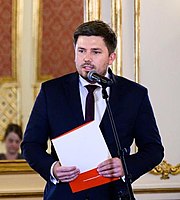 The Palace of Culture and Science, where the university is located The Palace of Culture and Science, where the university is located | |
| Type | Private |
|---|---|
| Established | 1997; 28 years ago (1997) |
| Rector | Professor Stanisław Mocek |
| Honorary President | Professor Jadwiga Koralewicz |
| Academic staff | 200 |
| Students | 2,861 (12.2023) |
| Location | Warsaw, Masovia, Poland 52°13′54″N 21°00′23″E / 52.231667°N 21.006389°E / 52.231667; 21.006389 |
| Campus | Urban (Palace of Culture and Science) |
| Affiliations | National Accreditation Commission Conference of Rectors of Academic Schools in Poland Conference of Rectors of Non-Public Academic Universities International Association of Universities European School of Sustainability Sciences and Research European Association for International Education |
| Website | civitas.edu.pl/en |
| [REDACTED] | |
Collegium Civitas is one of Poland's leading non-public higher education institutions, as reflected in the Perspektywy Ranking. It is a member of the Conference of Rectors of Academic Schools in Poland (CRASP) and the Conference of Rectors of Non-Public Academic Universities (KRAUN). The university incorporates innovative practices in higher education, including interdisciplinary approaches, enhanced lecturer-student interaction, study abroad programs, internships, and support for individual student research projects.
It has a diverse student body representing over 60 countries. Collegium Civitas is also a signatory of the Magna Charta Universitatum and holds the Erasmus Charter for Higher Education 2021–2027. In 2023, the European Commission recognized Collegium Civitas as an Erasmus Without Paper (EWP) Champion.
On September 10, 2024, Collegium Civitas joined the Merito Group, the largest group of non-public universities in Poland.
History
Collegium Civitas traces its roots back to 1997 when it was established through the initiative of a group of distinguished scientists from the Polish Academy of Sciences (PAN). Professors from five institutes of PAN — Political Studies, Philosophy and Sociology, History, History of Art, and Slavic Studies — pooled their expertise and knowledge to establish Collegium Civitas. Since its inception, Collegium Civitas has been committed to providing modern, world-class higher education standards to both Polish and international students. Collegium Civitas was the first non-public university in Poland to welcome foreign students in 1997.
As of 2024, the Rector is Professor Stanisław Mocek, the President is Professor Jadwiga Koralewicz, and the Chancellor is Roma Równiak.
Degrees
The university offers a wide range of bachelor's and master's degree programs taught in Polish, English and bilingual (Polish-English) across four primary disciplines: International Relations, Sociology, Management, and Journalism and New Media. Collegium Civitas also has the right to grant PhD degrees in Sociology, and Politics and Administration.
Location
The university is strategically situated within the iconic Palace of Culture and Science in Warsaw, the capital of Poland.
Notable alumni

- Adrian Kubicki (born 1987), Consul General of the Republic of Poland in New York City.
- Paulina Matysiak (born 1984), member of the 9th term Sejm.
- Marcin Porzucek (born 1984), politician.
- Robert Rowiński (born 1984), dancer, choreographer, and model.
- Jakub Sławek (born 1976), diplomat.
- Jakub Wesołowski (born 1985), film, television, and theatre actor; journalist.
- Maciej Żywno (born 1976), politician and educator
Notable faculty

- Bronisław Komorowski (born1952), historian, president of Poland, and Polish Minister of Defence
- Henryk Lipszyc (born 1941), scientist and professor of Japanese studies.
- Rafał Pankowski (born 1975), sociologist and political scientist.
- Wojciech Roszkowski (born 1947), historian and politician.
- Jacek Saryusz-Wolski (born 1948), diplomat and politician.
- Rafał Trzaskowski (born 1972), politician.
- Edmund Wnuk-Lipiński (1944-2015), sociologist, political scientist, and writer.
- Jacek Żakowski (born 1957), journalist and author.
- Krzysztof Zanussi (born 1939), film and theatre director, producer and screenwriter.
Programs in English
- 3-year BA in International Relations
- 3-year BA in Sociology
- 3-year BA in Management
- 3-year BA in Journalism and New Media
- 2-year MA in International Relations
- 2-year MA in Sociology
- 2-year MA in Management
- PhD in Sociology
- PhD in Politics and Administration
Programs in Polish
- 3-year BA in International Relations
- 3-year BA in Sociology
- 3-year BA in Management
- 3-year BA in Journalism and New Media
- 2-year MA in International Relations
- 2-year MA in Sociology
- 2-year MA in Management
- 5-year MA in Law
- PhD in Sociology
- PhD in Politics and Administration
References
- "Higher education in the 2023/24 academic year" (in Polish). Statistics Poland. Retrieved 1 July 2024.
- "About us; History".
- "About us; Leadership".
- ^ Yearbook of Polish Foreign Policy, Volume 1998, 1999.
- Michal Murawski (2019). The Palace Complex; A Stalinist Skyscraper, Capitalist Warsaw, and a City Transfixed
- "Consul General in New York - Poland in US". Poland in US - Gov.pl website.